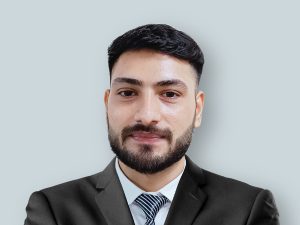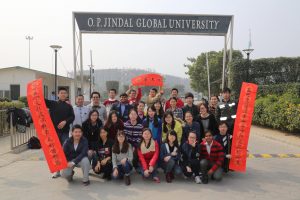Political systems across the world have witnessed significant changes in the modern times. Understanding the gamut of developments and tracing the course of political evolution in its entirety requires students of political science to analyse the world around them through a broader perspective. As contemporary world politics reinvents itself, so does the study of politics or political science. Higher education needs to push the envelope of singularly-focussed discipline specialisations to embrace the growing interconnectedness of different subjects. Leading the way, Jindal School of International Affairs (JSIA) has introduced an interdisciplinary three-year B.A. (Hons.) Political Science programme.
Whether it is to analyse the drastically changing voting patterns in major elections worldwide; evaluate the political impact of economic crises over the years or vice-versa; amend legal systems; create policies catering to modern needs and challenges; ascertain various leadership styles, political thought or philosophies; learn about the emerging means of mass communication; observe new trends in governance; predict the future of politics; or even to answer the questions of privacy arising from contact-tracing apps being deployed by governments in many countries to control the spread of Covid-19—there’s a lot more to learn about politics than meets the eye.
For political science graduates to make sense of the world around them, they have to go beyond theories spanning liberalism, Marxism, democracy, autocracy, federalism and populism, among others. While a strong understanding of these theories may well be at your fingertips from any mainstream political science programme, the real world reveals the need for a more integrated practical application.
Imagine a scenario in which you are a fresh political science graduate and have been asked to do a sample survey of women aged between 18 and 25 in a village and list out the criteria on which they will cast their votes in the next elections. Interesting, isn’t it? You are confident to go out there and chalk out the best sample size possible for the survey; but here is the catch—you meet a semi-literate woman who does not know the difference between Panchayat elections and Lok Sabha elections and has never applied for a voter card in her life. Will you exclude her as she has never voted before, and even if you do so, how will you deal with the myriad other challenges that will come your way? All the theories learned in political science silos in the classroom would stand incomplete at this point and only an interdisciplinary knowledge of psychology, gender, sociology, economics, and human behaviour would come in handy. That is exactly how JSIA’s multidisciplinary new political science programme offers an edge over others.
In a nutshell, your future careers will demand you to not just be a subject expert in core political science topics, but to be savvy to other disciplines that are equally important to gaining a holistic idea of how a society functions and the way heterogenous populations co-exist. Political science is much more than electoral battles and hegemony of power. Your career could likely shape in a linear fashion without an interdisciplinary perspective, lacking depth and scope to explore a variety of career prospects, traditional or contemporary.
The time has come for traditional disciplines to step out of their silos and integrate interdisciplinary perspectives. Here’s a look at how different subjects can enhance political science education.
Economy and polity
Socratic political philosopher, Aristotle, is one of the first among many to have given a working definition of political science. He said that “politics is not an exact theoretical science and mathematical theorems should govern political enquiry.”
Mathematical theorems are the basis of many economic theories on which democracies all over the world sustain and achieve growth. A working knowledge of economics gained during a multidisciplinary political science programme could help you fix market failures, decide minimum wages and retail price for services and goods, or distribute resources equitably.
Knowledge of terms like trade deficit, inflation, recession, repo rate would always come handy to a political science graduate who wants to build a career in research, social entrepreneurship, or even run for elections. Undoubtedly, a good political leader is one who knows the beat of the socio-economic strata of the community.
The salient correlation between politics and economy has been demonstrated time and again by the greatest of political theorists who prescribed major political ideologies and economic theories that prevail even today. Consider Karl Marx, who not only introduced the world to the communist ideology, but also laid the foundation for understanding labour division and its relation to capital. The likes of Marx, Adam Smith and John Maynard Keynes contributed substantially to the formalisation of economics as a discipline, while coming from political perspectives.
Understanding legal systems for good governance
If you are considering getting into public policy management or becoming a political analyst or legislative assistant after completing your degree in political science, a strong foundation of legal knowledge would place you at an altar higher than your contemporaries.
Laws are important because they are the basic guidelines as to what should be accepted in the society. The non-differentiating characteristic (Rule of Law) brings harmony and minimises the scope of conflict between social groups and communities. It is impossible to even imagine a world without a legal framework.
This is the reason that most countries in the world are governed by a parliamentary system. Our elected legislators are reposed with the authority to pass an act in the parliament that subsequently becomes a law after the President’s assent. Examples of politics coupled with law are woven into the very fabric of governance.
Studying sociology and psychology to understand voting patterns, leadership and more
Do your coffee table discussions usually involve forecasting elections? Have you always kept track of political campaigns in different parts of the world? Do you have the latest public opinion polls at your fingertips?
If you’re passionate about politics and have a knack for numbers, then there’s an exciting career in psephology waiting for you. Psephology is the statistical and scientific study of elections that analyses electoral and voting trends, behaviour and patterns and helps with election predictions and forecasting.
In today’s context of constantly evolving politics, it’s an area that’s becoming increasingly relevant. India needs trained psephologists who are equipped with the skills to analyse and predict the outcomes of an election quantitatively as well as qualitatively. Apart from knowing how to crunch big numbers out of huge data bases, a career in psephology will call for a broad-based perspective. You cannot have a fine eye for what happens at the electoral ballot unless you are clued in to a variety of related aspects.
Psephology is one among a growing body of professions stemming from the study of politics. The scope for political science graduates is broadening rapidly in today’s world. But to succeed in fully comprehending politics, leadership, and the political behaviour of people, one has to understand that society stands at an intersecting point of caste, culture, religion, economics, and complex layers of social relationships. Each of these factors carries its own weight when it comes to analysing political phenomena. This means a sociological perspective is indispensable to understanding the complete ambit. The study of psychology will also complement political science education in a big way.
Emerging careers in politics call for diverse perspectives and a multidisciplinary curriculum
Though there is no dearth of undergraduate political science programmes in India, one that recognises emerging themes of both study and practice is a fresh prospect. As India’s first global policy school, Jindal School of International Affairs is positioning itself as a changemaker. Blending interdisciplinary subjects to offer a holistic perspective, JSIA is prepared to skill its students with contemporary knowledge and insights that draw from a variety of disciplines.
In a traditional political science programme, students may be expected to go beyond their course curriculum to gain a holistic understanding of the interplay between politics and other factors in the real world. At JSIA, an interdisciplinary approach to the study of politics and the wider gambit of cross-listed electives is intrinsic to the curriculum. An up-to-date knowledge will no longer remain outside the realm of institutional learning. Synthesis of ideas from multiple disciplines and perspectives will help you jump off the boundary wall of set patterns of political solution and help you in bringing something new to the table.
How JGU plays a role in exposing its students to the interplay between different disciplines
Ever since its inception in 2009, O.P. Jindal Global University (JGU) has been challenging the very traditional and fundamental concept of specialisations that remain within defined streams of humanities, commerce, and science.
Interdisciplinarity has always been at the heart of JGU. All its schools—Law, Business, International Affairs, Government & Public Policy, Liberal Arts & Humanities, Banking & Finance, Art & Architecture, Environment & Sustainability—operate from the same campus where a steady flow of knowledge transfer and disciplinary exchange between students and faculty takes place.
The university offers cross-listed electives across its nine schools. So a student of B.A. (Hons.) Political Science programme can opt to study a paper in Conflict in Laws at Jindal Global Law School or enrol for an elective on Environmental Films and Visual Media taught by faculty of Jindal School of Liberal Arts & Humanities. The options are exhaustive, and each course is crafted by faculty and industry practitioners of international repute; some have even been incorporated based on student interests and requests. By expanding their horizons through a range of cross-listed electives, students stand to gain a better understanding of the world around them.


